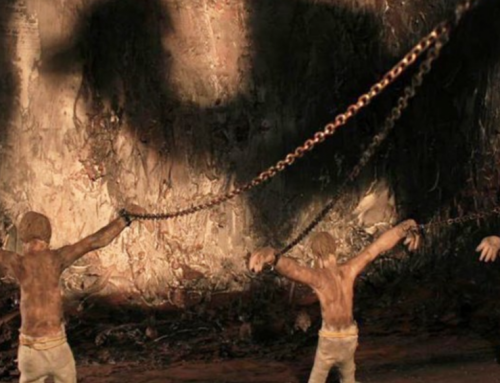and its demise is accelerating in the absence of integrity, principles, patriotic guts and genetic mutation
Three things you might not know
- The Economist Intelligence Unit’s “Democracy Index 2016,” ranks the USA 21st among 165 independent states. Norway is #1. Canada is #6.
- The US dropped out of the top category of “full democracies” (19 countries) and joined 57 “flawed democracies,” as it declined significantly between 2006 and 2016.
- The leadership capacity to stop the long-term decline of democracy must be assessed within the genetic limitations of the human species and our inability “to make choices with a purely biological instrument.”
(7 minute read)
No one is going to “make America great again” until someone acknowledges that democracy is in serious decline, sick as hell and suffering from an ideological pathogen, an internal cancerous disease, and an inability to genetically mutate. There is no “again” in America until its democracy is fixed. America, now ranked as a “flawed democracy,”[1] is sliding precipitously in the wrong direction and the decline won’t be stemmed by current leadership, and perhaps not until there is a generational change in leadership. And Canada is on a similar slippery slope.
For decades, the magnitude of change needed has exceeded the capability of leadership that has lacked the requisite principles, values and integrity. And in the US, the election of Donald Trump has exacerbated the spread of the disease. Democracy, supposedly the public’s immune system to fight kleptocracy – pernicious greed, malignant corruption and the rape of rights – has failed. It has never lived up to being the prescribed antidote to Darwin’s genetically determined human behavior.
“The species lacks any goal external to its own biological nature.” – Edward O. Wilson
Is the experiment failing?
George Washington said, “The preservation of the sacred fire of liberty . . is finally staked, on the experiment entrusted to the hands of the American People.” And Thomas Jefferson added, “No experiment can be more interesting than that we are now trying….” Democracy is an experiment. And, as we know, the success of an experiment is grounded in the scientific method and the principle that a hypothesis is formed and then the experiment moves forward systematically testing, observing, measuring and modifying the hypothesis. Today, if we honestly observe the reality of the experiment “entrusted to the hands of the American People,” we would accept that the metrics indicate systemic failure.
We should stop debating the self-interests of successive governments and narrow ideologies, the excessive profit bias of corporations and ratings bias of the press (owned by corporations), and start addressing the very real problem, the sinking foundation of democracy. Of course, that would mean accepting a new hypothesis, changing the terms of the experiment, contradicting founding fathers, and climbing another mountain. That sounds like its almost beyond our human capacity for change. So far it has been. Because it would require changing our belief system and adopting new principles, values and a large dose of integrity. In turn, that would require our innate genetic bias to adapt, in particular, what psychological research has proven for decades, our “confirmation bias” – accepting what fits our belief system and rejecting what doesn’t, rather than exploring new possibilities.
Jack and Sara Gorman, father-daughter doctors, in their book Denying to the Grave: Why We Ignore the Facts That Will Save Us, set out all the evidence we need to understand why we ignore the facts and cling to our beliefs, even when confronted with overwhelming evidence. They focus on the psychology of the health sciences and denial of the facts but one quote jumped off the page: “It feels good to ‘stick to our guns’ even if we are wrong.” We all do it. But if you’re the president of a flawed democracy, the United States, a believer in conspiracy theories and a pathological liar, then it’s even more frightening. So I am not so sure that the facts in the report below will do much to shift the thinking about democracy, let alone move a few good men and women to step up and offer dramatically different leadership; a wise, strong group of true patriots rather than the current collection of so-called leaders “shrinking from the service of their country.”
“These are the times that try men’s souls. The summer soldier and the sunshine patriot will, in this crisis, shrink from the service of their country; but he that stands it now, deserves the love and thanks of man and woman.” – Thomas Paine, The American Crises (1776-1783)
 The Economist Intelligence Unit’s “Democracy Index 2016,” in its ninth report on global democracy, delivers the metrics and a wake up call for anyone truly interested in how democracy is faring. Not well. It’s a sick elephant. Out of 165 states analyzed, only 19 are considered “full democracies, and the USA is not among them. Canada is #6. Number one is Norway.[2] You will be surprised at some of the countries ahead of America.
The Economist Intelligence Unit’s “Democracy Index 2016,” in its ninth report on global democracy, delivers the metrics and a wake up call for anyone truly interested in how democracy is faring. Not well. It’s a sick elephant. Out of 165 states analyzed, only 19 are considered “full democracies, and the USA is not among them. Canada is #6. Number one is Norway.[2] You will be surprised at some of the countries ahead of America.
Unfortunately, most people don’t give a damn, don’t read these reports and in a culture overwhelmed with vacuous tweets, fake news and small-minded ideological blathering, things like the state of democracy are relegated to the low-ratings inbox of every newsroom in the nation. Only a few serious, non-political individuals pay attention to such fundamentals. And that’s just where politicians – the beneficiaries of a malignant system – want to keep it. Out of sight, out of mind.
The problem in America, Canada and many other nations is that no one in leadership will admit that democracy doesn’t work. Because it works for the politicians, the lobbyists and minority interests but not the majority of people, the people suffering from the internal cancer called apathy. What politician does not want a system where he or she only has to get between 20-30% of the citizens to vote for them? It’s a lot easier to reach, influence and marshal a minority of people than to convince a majority.
In reality, democracy is rule by minority: Trump was elected by 25% of eligible voters; Trudeau by 27% (see earlier blog: Why does everyone ignore the numbers?). The oft repeated declaration that the “the people have decided” and that a politician has a mandate is pure falsehood. Democracy has failed – the people – time and time again. But it serves the kleptocracy well.
“There may not be an American character, but there is an emotion of being American. It has many resemblances to being Russian – that feeling of nostalgia for that undetermined future when man will have improved himself beyond all recognition and all will be well.” – Sir V. S. Pritchett (1900-1997)
Darwin trumps intellectual optimism and fake patriotism
In understanding the state of democracy, the twentieth century “feeling of nostalgia” cited by Sir Pritchett, when coupled with the eighteenth century optimism of the Marquis de Condorcet when he wrote Sketch for a Historical Picture of the Progress of the Human Mind (1794), exemplifies the naiveté of human hope and the limitations of the human intellect. Looking at our brief history since the Enlightenment, humankind has placed its hope in scientific, intellectual and moral progress and yet, despite much scientific advancement, three hundred years later we still cling to a chimera that someday “all will be well.”

Marquis de Condorcet (1743-1794)
Condorcet posited that our moral and social inadequacies – “evils” – are the result of ignorance and error rather than an inevitable consequence of human nature.[3] He can been excused for such optimism about human nature because of the limitations of knowledge in the late 18th century. But today, building on Darwin’s work and the study of social psychology, evolutionary biology and archaeology, we are developing a deeper understanding of human behavior. And it’s not that promising in terms of where we are going. As Edward O. Wilson writes in his book The Social Conquest of Earth: “Futurists are prone to dwell upon those directions which, in their opinion, humanity should go. But given our miserable lack of self-understanding as a species [my italics], the better goal at this time may be to choose where not to go.”[4]
It could be said that one of the decisions of “where not to go” is connected to our continuing belief in the current state of democracy. If it’s in decline, we don’t want to go there, even if we are told that it is our saving grace and fed an endless clarion of national anthems and patriotic clichés. Patriotism and nationalism are double-edged swords and as H. G. Wells said in Future in America, “Patriotism has become a mere national self-assertion, a sentimentality of flag-cheering with no constructive duties.” [other then send the very young to war]. And George Orwell wrote an essay, Notes on Nationalism in which he said, “Nationalism is not to be confused with patriotism … Patriotism is of its nature defensive, both militarily and culturally. Nationalism, on the other hand, is inseparable from the desire for power. The abiding purpose of every nationalist is to secure more power and more prestige, not for himself but for the nation or other unit in which he has chosen to sink his own individuality.” Shortly after that Orwell wrote Nineteen Eighty-Four, fictionally illustrating his very real concerns about the danger of autocracy and fascism and the complete loss of democracy.
“Our country, right or wrong! When right, to be kept right; when wrong, to be put right!” – Carl Schurz, U.S. Senate (1872).
Despite centuries of wise words and actions from the likes of Carl Schurz, Thomas Jefferson, Sir John A. Macdonald and Laura Secord, our courage to “put right” a country has been overwhelmed by our “survival of the fittest” genome. Darwinism has trumped all but the truest of patriots.
Democracy won’t evolve until we do
Nationalism has been built on our tribal instinct to belong and on group selection that Wilson defines “as the driving force of where we have been and where we are going.” Our ancestors conquered lands, staked out territories, defended them and then called it our nation. And today, the world is an aggregation of more than 200 nations and territories with arbitrary borders, walls and fences, all claiming sovereignty and some claiming to be democratic. And yet, the “Democracy Index, 2016,” in addition to the 19 countries that make the grade as “full democracies, lists 57 “flawed democracies,” and the rest as “hybrid regimes.” This means that if we use as a benchmark the recent founding of the US, 240 years ago, then the grand experiment of democracy has managed to transform only 11.5% (19) of potential jurisdictions into full democracies. These 19 “full democracies” are home to about 332 million people, just a few million more than live in the United States, and they represent less than 5% of the world’s population. So much for the spread of democracy.
If these numbers are not a measure of outright failure, they certainly are empirical evidence that we humans generally, and leaders specifically, are not yet capable of achieving what we have been promising our off-springs for the past two centuries. Reality is that democracy, purportedly one of the heralded goals of our species, remains a distant “shining city on a hill” – to borrow an oft spewed political platitude. What the experiment has proven is that we humans lack the biological combination of intellectual and moral depth, and requisite will, to change the democratic hypothesis – to change the rules, adjust the experiment and have the courage to build something new and better.
We humans are living proof of the height of our hypocrisy and the low of our animal nature. Democracy won’t evolve until we do.
“Only the Utopians know that the time is never ripe for courage, virtue and wisdom – and that if men do not make the most of their time, then time will make the most of them.” – Sydney Harris, A Majority of One (1954)
Perhaps if we could see democracy’s history for the confirmation bias that it is and free our thinking from its encumbering yoke, we might be able to look beyond the near horizon and see how the decline of democracy is paralleling our recurring lost empires, gradually decaying under the weight of arrogance and ignorance and succumbing to the insatiable selfishness and intellectual limitations of our human condition.
Footnotes:
- The Economist Intelligence Unit’s Democracy Index, 2016, p. 7, Table 2
- Ibid
- Condorcet, http://www.mitpressjournals.org/doi/abs/10.1162/0011526041504506#.WLxowBDzHVx
- The Social Conquest of Earth by E. O. Wilson (2012), p, 287







Great column,David. It’s difficult to believe only 50%of eligible voters bothered to vote in such an incredibly divisive contest. The apathy is staggering..
@Kelly: And when you compare it to voter turnout in countries like Belgium and Australia and watch the US sliding into the “flawed democracies” category behind the likes of Uruguay and all the Scandinavian countries, you begin to realize the apathy can’t be genetically rooted, it’s culturally rooted. The good news is, we can change a cultural, even if it is hard work and might take a generation or two. Start teaching the grandchildren, soon.